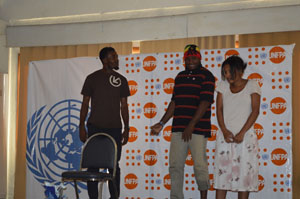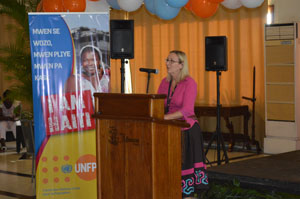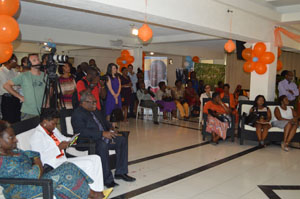
Abandoned by her boyfriend after Hurricane Sandy, following a succession of setbacks - lost of her family and her house among others- Stéphane takes refuge with her aunt, in a IDP camp, in Port-au-Prince. Shortly after, she is raped by a friend of his cousin.
This is the climax of the Theatre Forum presented by the group « Rescapés » (survivor group), on the occasion of the celebration of the World Population Day, focused on the theme "vulnerable populations in emergency situations".
Marie Moise Louissaint, 22, young ambassador for UNICEF, lived in a camp with her family for 6 months after the earthquake of January 2010. This sequence talked to her.
¨We must get rid of the camp logic and set up preferably stable housing. We should also take steps to identify the attackers, she said.
Miss Louissaint was in a discussion panel attended by key players in emergencies response.

« We want to focus on young women and girls, whose specific needs are often ignored in emergency situations », says the Representative of the United Nations Population Fund.
According to Marielle Sander, one of the ways for not being overwhelmed in times of crisis, by the number of individuals seeking the aid, is to plan the needs of the most vulnerable - women, girls and the disabled - before a crisis happens.
These comments are well received by Katiana Michel, 20 years old, senior in high school. This young dancer, who is also a member of the drama club of the NGO FOSREF, recalls herself her situation, following the passage of Hurricane Jeanne in Gonaives, in 2004.
« My house has been flooded, I stayed seven days on the roof of a building in Raboteau, without washing myself. After four days, I caught an infection ».
For Katiana, the most important thing is prevention.We should also, she added, train the young people, so that they can protect themselves in emergency situations and help other young people. « It is especially important to do everything to preserve the dignity of women and girls », she insists.
Women, children and youth represent more than three quarters of over than 50 million people who have been forced to leave their homes by conflict or disaster in most regions of the world.

The theme of this year "The vulnerable populations in emergency situations" is topical for Haiti, given that the country could face - in the second half of 2015 - a complex humanitarian situation marked by several risks: natural disasters, risk of violence inherent in the organization of the forthcoming parliamentary and presidential elections, imminent deportations of Haitians from the Dominican Republic.
The World Population Day was an opportunity to alert on the hazards and promote appropriate interventions for vulnerable populations.

